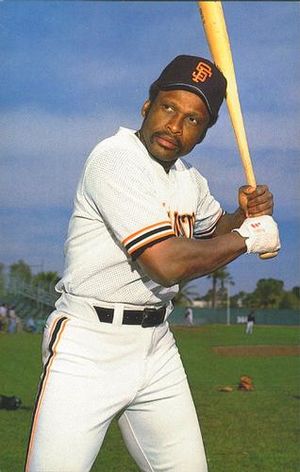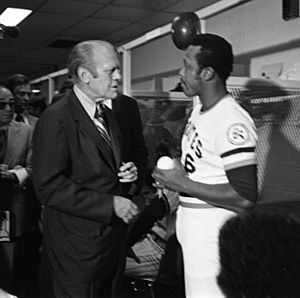Al Oliver facts for kids
Quick facts for kids Al Oliver |
|||
|---|---|---|---|

Oliver with the San Francisco Giants in 1984
|
|||
| Outfielder / First baseman | |||
| Born: October 14, 1946 Portsmouth, Ohio, U.S. |
|||
|
|||
| debut | |||
| September 23, 1968, for the Pittsburgh Pirates | |||
| Last appearance | |||
| October 5, 1985, for the Toronto Blue Jays | |||
| MLB statistics | |||
| Batting average | .303 | ||
| Hits | 2,743 | ||
| Home runs | 219 | ||
| Runs batted in | 1,326 | ||
| Teams | |||
|
|||
| Career highlights and awards | |||
|
|||
Albert "Al" Oliver Jr. (born October 14, 1946) is a former professional baseball player from America. He played in Major League Baseball (MLB) as an outfielder and first baseman. His career lasted from 1968 to 1985.
Al Oliver was a key player for the Pittsburgh Pirates. He helped them win five division titles and the World Series in 1971. He was chosen for the All-Star team seven times. In 1982, playing for the Montreal Expos, he led the National League in batting average and RBI. Oliver hit over .300 (a great batting average) eleven times. He also won the Silver Slugger Award three times.
After playing for the Pirates, he joined the Texas Rangers, Montreal Expos, San Francisco Giants, Philadelphia Phillies, Los Angeles Dodgers, and Toronto Blue Jays. His nickname was "Scoop". Oliver batted and threw left-handed. He was inducted into the Pittsburgh Pirates Hall of Fame in 2025.
Contents
Playing for the Pittsburgh Pirates
Al Oliver went to Portsmouth High School in Portsmouth, Ohio. He played baseball there with future MLB player Larry Hisle. Oliver was also a talented basketball player. He even earned a scholarship to play college basketball.
But before college, he tried out for the Philadelphia Phillies and the Pittsburgh Pirates. His father wanted him to go to college. However, he allowed Al to sign with the Pirates at age 17 for $5,000.
Oliver joined the Major Leagues on September 14, 1968. This was the same day his father passed away. He played in four games that season. In his first full season in 1969, Oliver batted .285. He hit 17 home runs and had 70 runs batted in. He finished second in the Rookie of the Year voting.
In 1970, Oliver batted .270. The Pirates won the National League East title. This was their first trip to the postseason since 1960. However, they lost to the Cincinnati Reds in the playoffs.
Making History in 1971
On September 1, 1971, the Pirates made history. They had the first all-black starting lineup in league history. Oliver played first base. Other famous players in that lineup included Roberto Clemente and Willie Stargell.
Oliver finished the 1971 season with a .282 batting average. He had 31 doubles and seven triples. After beating the San Francisco Giants in the playoffs, the Pirates won the World Series. They defeated the Baltimore Orioles in seven games. Oliver was their regular center fielder.
All-Star Seasons with the Pirates
In 1972, Oliver's batting average went up to .312. He hit 12 home runs and had 89 RBI. He was chosen for his first All-Star game. He also finished seventh in the National League MVP voting. In 1973, Oliver hit 20 home runs and had 99 RBI. The Pirates won their third straight division title.
In 1974, Oliver batted .321 with 198 hits. He also had 38 doubles and 12 triples. He was seventh in the NL MVP voting again. Willie Stargell said Oliver "all he ever did was crush the ball." Oliver had a 23-game hitting streak in 1974. The Pirates won their division but lost in the playoffs.

In 1975, Oliver scored 90 runs. He batted .280 with 18 home runs and 84 RBI. He played in the All-Star game for the second time. The Pirates won their division again.
In 1976, Oliver batted .323. This was the first of nine straight seasons where he hit over .300. He played in the All-Star game again. In 1977, Oliver batted .308 with 19 home runs and 82 RBI. He also stole a career-high 13 bases.
Playing for the Texas Rangers
In December 1977, Oliver was traded from the Pirates to the Texas Rangers. This was a big trade involving four teams and eleven players.
In 1978, Oliver had a .324 batting average. This was the second-best in the American League. He also had 170 hits and 35 doubles. In 1979, Oliver batted .323, which was fifth in the league.
Oliver wore the number 0 on his uniform. He was the first player in MLB to do this. In 1980, he played in all 163 games for Texas. He had career highs in hits (209), doubles (43), and RBI (117). He batted .319 and was chosen for the AL All-Star team. Oliver won his first Silver Slugger Award as an outfielder. On August 17, 1980, he set an American League record. He had 21 total bases in a doubleheader. This included four home runs, a double, and a triple.
Oliver hit three home runs in a game twice. Once on May 23, 1979, and again on August 17, 1980.
In 1981, Oliver batted .309. He was sixth in hits with 130 and second in doubles with 29. He played in his fifth All-Star game. He also won his second straight Silver Slugger Award, this time as a designated hitter. He was the first player to win this award at two different positions. Oliver became the Rangers' all-time leading hitter with a .319 average.
Playing for the Montreal Expos
Oliver wanted a new contract with the Rangers. When they said no, he asked to be traded. On March 31, 1982, he was traded to the Montreal Expos. He became the Expos' starting first baseman.
In 1982, Oliver had his best season. He hit a career-high .331 batting average. This won him the National League batting title. He also led the NL in hits (204), doubles (43), and total bases (317). He tied for the RBI lead with 109. He hit a career-high 22 home runs.
He played in his sixth All-Star game. He finished third in the NL MVP voting. He won his third straight Silver Slugger Award, this time as a first baseman. He was also named the Montreal Expos Player of the Year.
In 1983, Oliver led the NL in doubles with 38. He was fourth in the NL in hits with 184. He batted .300 again. He reached 2,500 career hits on August 10, 1983. Oliver was selected for his seventh All-Star game. He started at first base in the 1983 All-Star Classic.
Later Career: Giants, Phillies, Dodgers, and Blue Jays
On February 27, 1984, Oliver was traded to the San Francisco Giants. Later that year, on August 20, 1984, he was traded again. This time he went to the Philadelphia Phillies.
In 1985, Oliver was traded to the Los Angeles Dodgers. Then, on July 9, 1985, he was traded to the Toronto Blue Jays. With the Blue Jays, Oliver had two game-winning hits in the 1985 American League Championship Series. However, his team lost the series. Oliver batted .375 in the series. He is one of the few players to play for both Canadian MLB teams.
Oliver believes his career ended because of "collusion." This means baseball team owners secretly agreed not to sign certain players. Courts later ruled that this collusion happened. In 1995, a judge ruled that Oliver was owed $680,031.05 because of this. Oliver felt he could have played four or five more years. Many people, including fellow player Andre Dawson, believe Oliver should be in the Baseball Hall of Fame.
Career Highlights and Records
Al Oliver batted .300 or more eleven times in his career. His 2,743 career hits rank among the top players of all time. During his playing days, he was third in hits among all players. Only Pete Rose and Rod Carew had more. He also ranks high in games played (2368), total bases (4083), RBI (1326), and extra-base hits (825).
He was among the league's top ten in doubles nine times. He was also in the top ten in hits nine times. He finished in the top ten in batting average nine times. Many people think he deserves to be in the Baseball Hall of Fame.
Oliver hit the last home run at Forbes Field. This happened on June 28, 1970. He also drove in the first run ever scored at Three Rivers Stadium. This was on July 16, 1970.
Personal Life
Al Oliver's son, Aaron Oliver, played football for Texas A&M University. His team won the 1998 Big 12 Conference Championship. Aaron caught the first touchdown pass in Big 12 history.
On April 22, 2013, the city of Portsmouth, Ohio, named Al Oliver "Mr. Ambassador." This was to recognize his efforts for his community.
Oliver is featured on one of the Floodwall Murals in Portsmouth, Ohio. These murals honor local baseball players.
In September 2014, Oliver released his second book. It is called Life is a Hit, Don't Strike Out. The book tells the story of his life and career.
See also
- List of Major League Baseball career hits leaders
- List of Major League Baseball career doubles leaders
- List of Major League Baseball career runs scored leaders
- List of Major League Baseball career runs batted in leaders
- List of Major League Baseball career total bases leaders
- List of Major League Baseball annual runs batted in leaders
- List of Major League Baseball batting champions
- List of Major League Baseball annual doubles leaders
 | Shirley Ann Jackson |
 | Garett Morgan |
 | J. Ernest Wilkins Jr. |
 | Elijah McCoy |

